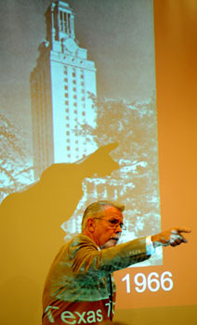
Ron McCarthy talks to fellow officers about "The Evolution of SWAT in America" during the 27th annual National Tactical Officers Association conference, which gathered for the first time in Pittsburgh yesterday. (Philip G. Pavely | Pittsburgh Tribune-Review)
If you spot an out-of-town SWAT convoy rolling through Downtown this week, it's probably not an emergency, but it would be best to get out of the way.
The 27th annual National Tactical Officers Association conference made its Pittsburgh debut yesterday at the David L. Lawrence Convention Center, where 750 police officers from 46 states will hone their tactical training and mingle with 200 vendors showing off heavy weaponry and everything from armored vehicles to self-expanding street barricades.
"For some departments, this is the most (SWAT) training they'll get all year," said Rob Cartner, the conference's training director. "Some don't have the resources."
For a registration fee of $550, officers can take in five days of training seminars, equipment demonstrations and incident "debriefing" sessions that evaluate how law enforcement officers responded to major emergencies such as the Fort Hood, Texas, massacre on Nov. 5.
Interest in the training made this year's conference the largest so far, Cartner said, adding that some drills might occur in the city outside the convention center.
Budget shortfalls in police departments nationwide have forced some to limit training and staffing or even eliminate SWAT squads altogether, retired Los Angeles Police Department Sgt. Ron McCarthy told officers during one of the first presentations.
The Los Angeles Police Department is the birthplace of the SWAT, or Special Weapons and Tactics, concept, which relies on small groups of specially trained police officers who volunteer for the assignment and meet rigorous standards.
Despite smaller budgets, the public's expectations of SWAT remain as high as ever, he said.
"Because you're the best, people will always be watching what you do," McCarthy said.
A training session about the Fort Hood massacre emphasized his point.
A veteran police officer instructor dissected the minute-by-minute police and SWAT response during and after the incident in which Army psychiatrist Nidal Hassan is accused of gunning down 12 soldiers and one civilian.
Confusion reigned over the chaotic military base long after a police officer stopped Hassan.
SWAT teams were told to search hundreds of rooms on the base for other potential shooters, but many of the rooms contained soldiers who had been told to seek shelter and protect themselves when the shooting occurred.
The confusion nearly led to an exchange of friendly fire. The instructor stressed that officer squad cars must be equipped with shotguns or rifles to deal with such incidents. The two officers who confronted Hassan were carrying only their service pistols.
Pittsburgh police are training officers to use assault-style service rifles purchased in response to the April 4, 2009, Stanton Heights shooting incident in which a gunman killed three officers and injured a fourth before he was captured. Pittsburgh police plan to buy 96 rifles by year's end.
Pittsburgh SWAT Officer Steve Mescan said the city police department and state police are co-hosts for the tactical officer association, which was founded in 1983 and has more than 30,000 members.
Mescan said Pittsburgh was chosen, in part, because its SWAT team last year received the association's "team valor" award for its performance during the Stanton Heights shootings.
"It's a huge honor to be hosting this, because it's chance to work with state police and to showcase the city," Mescan said.











